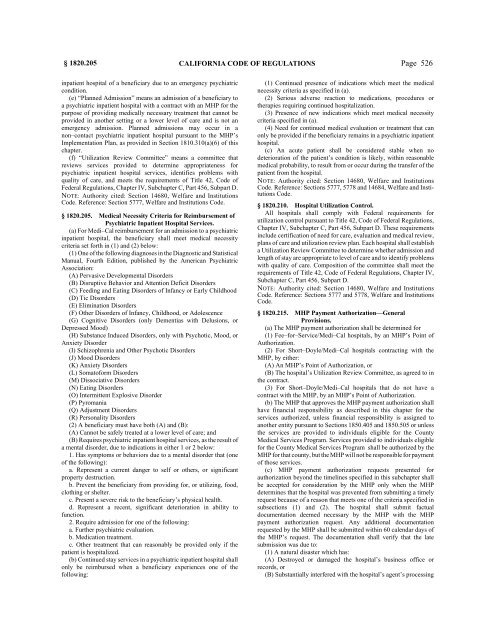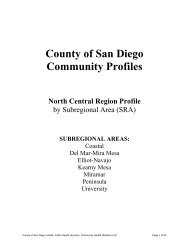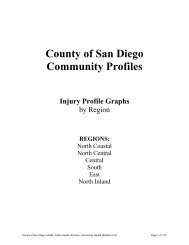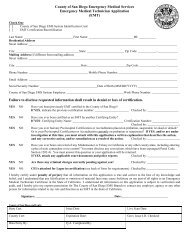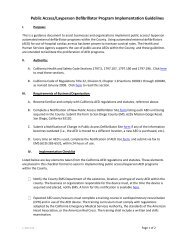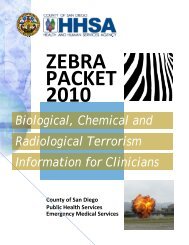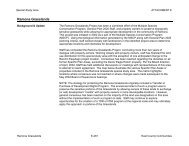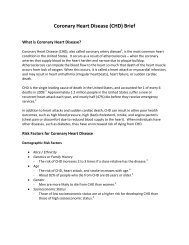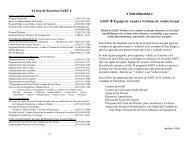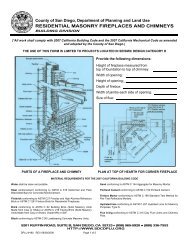CALIFORNIA CODE OF REGULATIONS - State of California
CALIFORNIA CODE OF REGULATIONS - State of California
CALIFORNIA CODE OF REGULATIONS - State of California
Create successful ePaper yourself
Turn your PDF publications into a flip-book with our unique Google optimized e-Paper software.
§ 1820.205 <strong>CALIFORNIA</strong> <strong>CODE</strong> <strong>OF</strong> <strong>REGULATIONS</strong><br />
Page 526<br />
inpatient hospital <strong>of</strong> a beneficiary due to an emergency psychiatric<br />
condition.<br />
(e) “Planned Admission” means an admission <strong>of</strong> a beneficiary to<br />
a psychiatric inpatient hospital with a contract with an MHP for the<br />
purpose <strong>of</strong> providing medically necessary treatment that cannot be<br />
provided in another setting or a lower level <strong>of</strong> care and is not an<br />
emergency admission. Planned admissions may occur in a<br />
non–contact psychiatric inpatient hospital pursuant to the MHP’s<br />
Implementation Plan, as provided in Section 1810.310(a)(6) <strong>of</strong> this<br />
chapter.<br />
(f) “Utilization Review Committee” means a committee that<br />
reviews services provided to determine appropriateness for<br />
psychiatric inpatient hospital services, identifies problems with<br />
quality <strong>of</strong> care, and meets the requirements <strong>of</strong> Title 42, Code <strong>of</strong><br />
Federal Regulations, Chapter IV, Subchapter C, Part 456, Subpart D.<br />
NOTE: Authority cited: Section 14680, Welfare and Institutions<br />
Code. Reference: Section 5777, Welfare and Institutions Code.<br />
§ 1820.205. Medical Necessity Criteria for Reimbursement <strong>of</strong><br />
Psychiatric Inpatient Hospital Services.<br />
(a) For Medi–Cal reimbursement for an admission to a psychiatric<br />
inpatient hospital, the beneficiary shall meet medical necessity<br />
criteria set forth in (1) and (2) below:<br />
(1) One <strong>of</strong> the following diagnoses in the Diagnostic and Statistical<br />
Manual, Fourth Edition, published by the American Psychiatric<br />
Association:<br />
(A) Pervasive Developmental Disorders<br />
(B) Disruptive Behavior and Attention Deficit Disorders<br />
(C) Feeding and Eating Disorders <strong>of</strong> Infancy or Early Childhood<br />
(D) Tic Disorders<br />
(E) Elimination Disorders<br />
(F) Other Disorders <strong>of</strong> Infancy, Childhood, or Adolescence<br />
(G) Cognitive Disorders (only Dementias with Delusions, or<br />
Depressed Mood)<br />
(H) Substance Induced Disorders, only with Psychotic, Mood, or<br />
Anxiety Disorder<br />
(I) Schizophrenia and Other Psychotic Disorders<br />
(J) Mood Disorders<br />
(K) Anxiety Disorders<br />
(L) Somat<strong>of</strong>orm Disorders<br />
(M) Dissociative Disorders<br />
(N) Eating Disorders<br />
(O) Intermittent Explosive Disorder<br />
(P) Pyromania<br />
(Q) Adjustment Disorders<br />
(R) Personality Disorders<br />
(2) A beneficiary must have both (A) and (B):<br />
(A) Cannot be safely treated at a lower level <strong>of</strong> care; and<br />
(B) Requires psychiatric inpatient hospital services, as the result <strong>of</strong><br />
a mental disorder, due to indications in either 1 or 2 below:<br />
1. Has symptoms or behaviors due to a mental disorder that (one<br />
<strong>of</strong> the following):<br />
a. Represent a current danger to self or others, or significant<br />
property destruction.<br />
b. Prevent the beneficiary from providing for, or utilizing, food,<br />
clothing or shelter.<br />
c. Present a severe risk to the beneficiary’s physical health.<br />
d. Represent a recent, significant deterioration in ability to<br />
function.<br />
2. Require admission for one <strong>of</strong> the following:<br />
a. Further psychiatric evaluation.<br />
b. Medication treatment.<br />
c. Other treatment that can reasonably be provided only if the<br />
patient is hospitalized.<br />
(b) Continued stay services in a psychiatric inpatient hospital shall<br />
only be reimbursed when a beneficiary experiences one <strong>of</strong> the<br />
following:<br />
(1) Continued presence <strong>of</strong> indications which meet the medical<br />
necessity criteria as specified in (a).<br />
(2) Serious adverse reaction to medications, procedures or<br />
therapies requiring continued hospitalization.<br />
(3) Presence <strong>of</strong> new indications which meet medical necessity<br />
criteria specified in (a).<br />
(4) Need for continued medical evaluation or treatment that can<br />
only be provided if the beneficiary remains in a psychiatric inpatient<br />
hospital.<br />
(c) An acute patient shall be considered stable when no<br />
deterioration <strong>of</strong> the patient’s condition is likely, within reasonable<br />
medical probability, to result from or occur during the transfer <strong>of</strong> the<br />
patient from the hospital.<br />
NOTE: Authority cited: Section 14680, Welfare and Institutions<br />
Code. Reference: Sections 5777, 5778 and 14684, Welfare and Institutions<br />
Code.<br />
§ 1820.210. Hospital Utilization Control.<br />
All hospitals shall comply with Federal requirements for<br />
utilization control pursuant to Title 42, Code <strong>of</strong> Federal Regulations,<br />
Chapter IV, Subchapter C, Part 456, Subpart D. These requirements<br />
include certification <strong>of</strong> need for care, evaluation and medical review,<br />
plans <strong>of</strong> care and utilization review plan. Each hospital shall establish<br />
a Utilization Review Committee to determine whether admission and<br />
length <strong>of</strong> stay are appropriate to level <strong>of</strong> care and to identify problems<br />
with quality <strong>of</strong> care. Composition <strong>of</strong> the committee shall meet the<br />
requirements <strong>of</strong> Title 42, Code <strong>of</strong> Federal Regulations, Chapter IV,<br />
Subchapter C, Part 456, Subpart D.<br />
NOTE: Authority cited: Section 14680, Welfare and Institutions<br />
Code. Reference: Sections 5777 and 5778, Welfare and Institutions<br />
Code.<br />
§ 1820.215. MHP Payment Authorization—General<br />
Provisions.<br />
(a) The MHP payment authorization shall be determined for<br />
(1) Fee–for–Service/Medi–Cal hospitals, by an MHP’s Point <strong>of</strong><br />
Authorization.<br />
(2) For Short–Doyle/Medi–Cal hospitals contracting with the<br />
MHP, by either:<br />
(A) An MHP’s Point <strong>of</strong> Authorization, or<br />
(B) The hospital’s Utilization Review Committee, as agreed to in<br />
the contract.<br />
(3) For Short–Doyle/Medi–Cal hospitals that do not have a<br />
contract with the MHP, by an MHP’s Point <strong>of</strong> Authorization.<br />
(b) The MHP that approves the MHP payment authorization shall<br />
have financial responsibility as described in this chapter for the<br />
services authorized, unless financial responsibility is assigned to<br />
another entity pursuant to Sections 1850.405 and 1850.505 or unless<br />
the services are provided to individuals eligible for the County<br />
Medical Services Program. Services provided to individuals eligible<br />
for the County Medical Services Program shall be authorized by the<br />
MHP for that county, but the MHP will not be responsible for payment<br />
<strong>of</strong> those services.<br />
(c) MHP payment authorization requests presented for<br />
authorization beyond the timelines specified in this subchapter shall<br />
be accepted for consideration by the MHP only when the MHP<br />
determines that the hospital was prevented from submitting a timely<br />
request because <strong>of</strong> a reason that meets one <strong>of</strong> the criteria specified in<br />
subsections (1) and (2). The hospital shall submit factual<br />
documentation deemed necessary by the MHP with the MHP<br />
payment authorization request. Any additional documentation<br />
requested by the MHP shall be submitted within 60 calendar days <strong>of</strong><br />
the MHP’s request. The documentation shall verify that the late<br />
submission was due to:<br />
(1) A natural disaster which has:<br />
(A) Destroyed or damaged the hospital’s business <strong>of</strong>fice or<br />
records, or<br />
(B) Substantially interfered with the hospital’s agent’s processing


